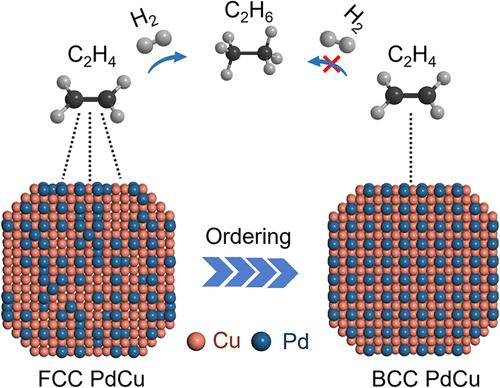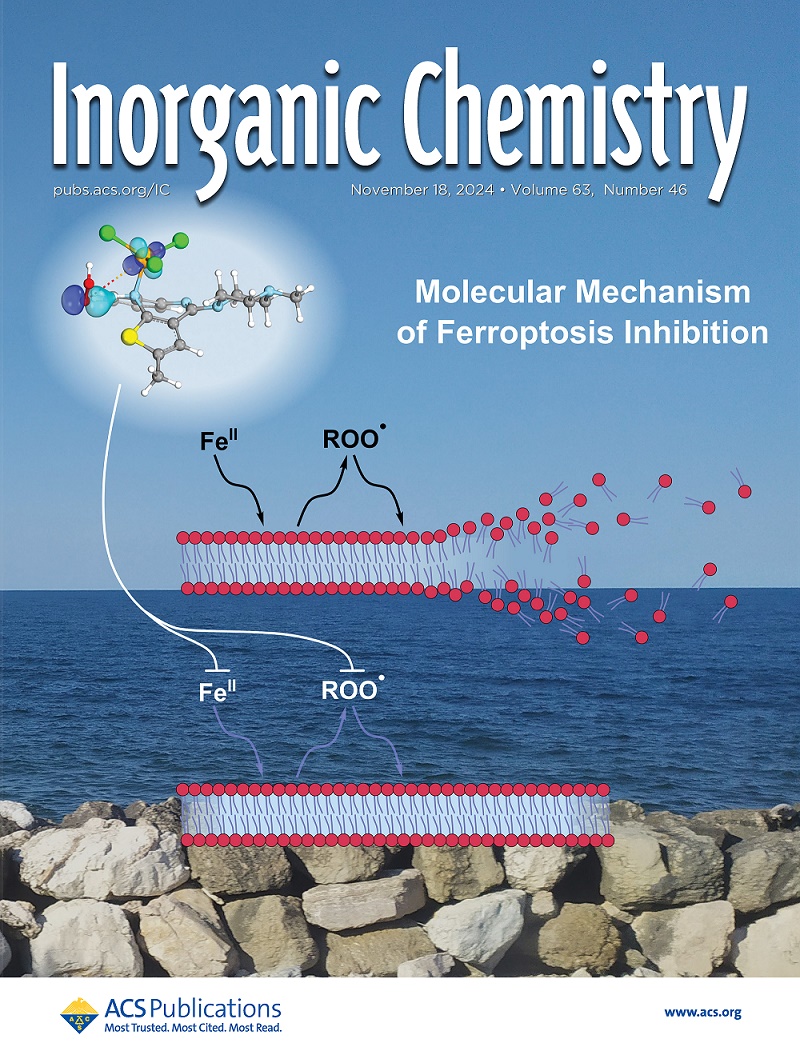From FCC to BCC: Engineering Pd Nuclearity in the PdCu Catalyst to Enhance Ethylene Selectivity in Acetylene Hydrogenation
IF 4.7
2区 化学
Q1 CHEMISTRY, INORGANIC & NUCLEAR
引用次数: 0
Abstract
The ability to finely tune the nuclearity of active metal sites is critical for designing highly selective catalysts, especially for hydrogenation processes. In this work, we developed a novel PdCu catalyst with an ordered body-centered cubic (BCC) structure, enabling precise control over Pd nuclearity to optimize selectivity. Using a facile polyol synthesis method, we modulated the Pd coordination environment, reducing the Pd–Pd coordination number from 3 (disordered face-centered cubic, FCC) to 0 (ordered BCC), thereby achieving full isolation of Pd by the surrounding Cu atoms. This structural transformation enhances hydrogen spillover and weakens ethylene adsorption, resulting in superior activity for the selective hydrogenation of acetylene to ethylene. The ordered PdCu supported on Al2O3 (o-PdCu/Al2O3) achieved a 99% acetylene conversion with an 84.5% ethylene selectivity at near-room temperature. This work highlights the importance of controlling atomic-scale nuclearity in metal catalysts and provides a promising strategy for improving the catalytic efficiency and selectivity in industrially significant processes.

从FCC到BCC:工程钯核在PdCu催化剂中提高乙炔加氢的乙烯选择性
精细调整活性金属位核的能力对于设计高选择性催化剂,特别是对于加氢过程是至关重要的。在这项工作中,我们开发了一种具有有序体心立方(BCC)结构的新型PdCu催化剂,可以精确控制Pd核以优化选择性。利用简单的多元醇合成方法,我们调制了Pd配位环境,将Pd - Pd配位数从3(无序面心立方,FCC)降低到0(有序BCC),从而实现了Pd被周围的Cu原子完全隔离。这种结构转变增强了氢气外溢,减弱了乙烯吸附,使得乙炔选择性加氢制乙烯的活性更强。Al2O3负载的有序PdCu (o-PdCu/Al2O3)在近室温下实现了99%的乙炔转化率和84.5%的乙烯选择性。这项工作强调了在金属催化剂中控制原子尺度核的重要性,并为提高工业上重要过程的催化效率和选择性提供了一个有前途的策略。
本文章由计算机程序翻译,如有差异,请以英文原文为准。
求助全文
约1分钟内获得全文
求助全文
来源期刊

Inorganic Chemistry
化学-无机化学与核化学
CiteScore
7.60
自引率
13.00%
发文量
1960
审稿时长
1.9 months
期刊介绍:
Inorganic Chemistry publishes fundamental studies in all phases of inorganic chemistry. Coverage includes experimental and theoretical reports on quantitative studies of structure and thermodynamics, kinetics, mechanisms of inorganic reactions, bioinorganic chemistry, and relevant aspects of organometallic chemistry, solid-state phenomena, and chemical bonding theory. Emphasis is placed on the synthesis, structure, thermodynamics, reactivity, spectroscopy, and bonding properties of significant new and known compounds.
文献相关原料
公司名称
产品信息
阿拉丁
palladium acetylacetonate (Pd(acac)2)
阿拉丁
copper nitrate (Cu(NO3)2·3H2O)
阿拉丁
sodium borohydride (NaBH4)
 求助内容:
求助内容: 应助结果提醒方式:
应助结果提醒方式:


